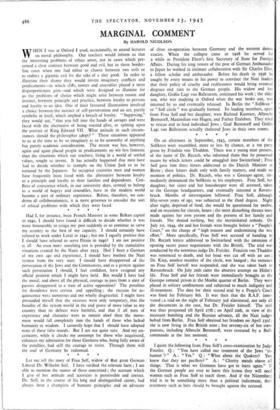Had I, for instance, been French Minister in some Balkan
capital in 1940, I should have found it difficult to decide virhether it was More honourable to resign my post suddenly or to continue to serve my country to the best of my capacity. I should certainly have refused to work under Laval in 1942 ; but am I equally positive that I should have refused to serve Petain in 1940? I am not positive at all. An even more searching test is provided by the cumulative situations created by the Nazis after 1933. Had I been a German of my own age and experience, I should have loathed the Nazi system from the very start. I should have disapproved of the persecution of the Jews and the Communists, and as a protest against such persecution I should, I feel confident, have resigned any official position which I might have held. But would I have had the moral, and above all the physical, courage to pass from a state of passive disapproval to a state of active opposition? The penalties for dissidence were certain and appalling ; the excuses for ac- quiescence were numerous and not wholly disgraceful. I might have persuaded myself that the excesses were only temporary, that the benefits of the system would in the end prove of more value to my country than its defects were harmful, and that if all men of experience and character were to remain aloof then the move- ment would fall completely into the hands of those who lacked humanity or wisdom. I earnestly hope that I should have adopted none of these false moods. But I am not quite sure. And my un- certainty, while it checks my contempt for those who acquiesced, enhances my admiration for those Germans who, being fully aware of the penalties, had still the courage to resist. Through them will the soul of Germany be redeemed. * * * *


























 Previous page
Previous page